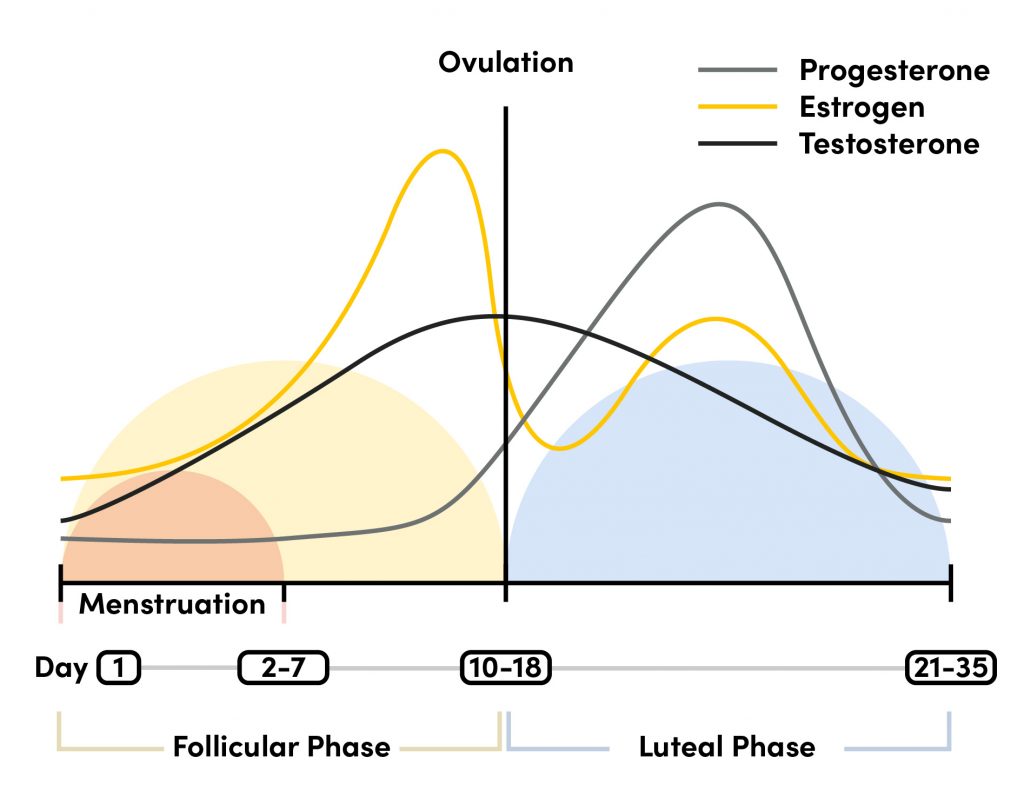6 Tips for Climbing Your Best in the Late Luteal Phase
Advice from coaches Maddy and Ella, based on their experiences!
What is the late luteal phase?

The luteal phase is the portion of our cycle from ovulation until menstruation begins.
On average, it’s between days 14-30, but this can vary lots person-to-person. (Tracking may help you figure out when your luteal phase is!)
In the late luteal phase, just before our period, we may experience symptoms, such as low energy, cramps, muscles aches, irritability and/or reduced motivation. (This is different for everyone!)
This may affect our climbing performance.
3 Tips from coach Maddy
I’ve been on peak performance redpoints trips during my late luteal phase, and over time, I’ve developed a process for myself to maximise my performance during this phase.
If you need to perform – perhaps for a competition or a trip – during a period which coincides with your late luteal phase, experiment in advance to see if there are any minor adjustments you can make to help you work with your physiology.
Here are the tips I have developed for myself, that may be helpful for others:
1. TAKE MORE TIME
I often feel a little sluggish and distracted or anxious during my late luteal phase.
It’s important that I take a little longer to warm up and ease myself into the session.
At the crag, this means a few more gentle hangs and more assistance on my power pull ups on our portable fingerboard when warming up.
I also take more time when going up bolt-to-bolt on the project to warm up on the moves and brush the holds.
2. ZERO EXPECTATION MINDSET
For me, adopting a zero expectation mindset for redpoint attempts (even more so than normal) seems to really help.
I like to use the phrases: “one move at a time” and “let’s see what happens”.
3. BREATHE
I make sure to take long, slow deep breaths throughout the day. It helps me to remain present, and recognise and let go of feelings of stress/anxiety before setting off on a redpoint.
3 Tips from coach Ella
Tracking is a great way to understand how we feel during our late luteal phase (and the rest of the cycle).
BUT, this doesn’t mean that we should let a previous experience dictate how we will feel or perform in later cycles.
There is a balance between being prepared and making adjustments, and checking in with how you feel in the moment.
Not every cycle is the same! I have noticed that my symptoms present differently if I’m training compared to if I’m climbing outdoors.
When we are training, we really push our bodies in order to adapt, but when we are redpointing or looking to climb our best outside, we often focus more on recovery.
I have found that my sleep and mood are better when I am well recovered and spending a lot more time outside.
This is my personal experience and may not be the same for everyone, but these are the things I have learnt:
1. BE FLEXIBLE
If I am outdoors, feeling well recovered, and not suffering from my usual PMS symptoms, I choose to push myself – I don’t change anything!
If I am outdoors, but experiencing PMS symptoms, I might choose to do slightly easier climbing, use more mental strategies, or spend more time getting my body warm and my mind in the right mindset. Keeping a curious mindset during this time really helps.
2. HONEST TRACKING
When I track, I am careful to ask myself honestly how I feel, and think about any reasons other than my cycle phase that may lead to a reduced performance.
3. DELOAD DURING THIS PHASE
When I am training and building more fatigue, I experience more symptoms.
Therefore, I look to deload during my late luteal phase. I try to spend more time warming up and use this time to focus on climbing efficiency.
Conclusion: How to climb your best in the late luteal phase
Everyone experiences the late luteal phase differently, and it’s important to remember that we shouldn’t go into our training or climbing with an assumption or expectation of how our menstrual cycle is going to affect our performance. As well as data from tracking previous cycles, we can use the time whilst we’re slowly warming up and easing ourself into the session to make a judgement on how we’re feeling.
Reducing your expectations and keeping an open, curious mindset may help; be honest with yourself about factors other than your menstrual cycle that may be affecting you.
Remember to breathe.
Lastly, you may want to schedule your deload week with your late luteal phase.
Follow Lattice Training on Instagram.
Follow coach Ella on Instagram.
Follow coach Maddy on Instagram.
Read more about the menstrual cycle and training.

